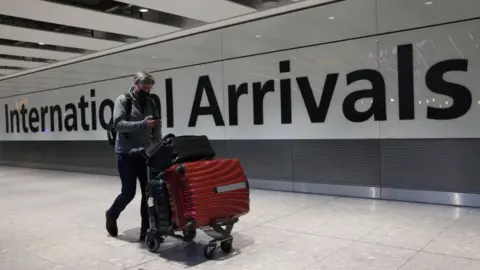Coronavirus: UK tightens travel rules amid Omicron spread
 Getty Images
Getty ImagesTravellers heading to the UK will now have to take a Covid test before their departure in an effort to limit spread of the virus, the government has said.
Health Secretary Sajid Javid said the tightened requirements would come into force from 04:00 GMT on Tuesday.
Everyone aged 12 and over will be required to take a pre-departure test a maximum of 48 hours before leaving.
Currently people only need to self-isolate until they test negative within two days of arriving.
Nigeria will be added from Monday to the red list of countries from where people arriving must quarantine in a hotel for 10 days, Mr Javid also confirmed.
The health secretary said the government's strategy since the discovery of the Omicron variant had been to "buy time" to assess and to "put in place protective measures", adding: "We've always said that we would act swiftly should new data require it."
The Department of Health and Social Care later said 21 Omicron cases linked to Nigerian travel had been discovered in recent days.
Mr Javid said this number was growing and Nigeria was now second only to South Africa in terms of linked cases to Omicron.
He called on people to get a booster vaccine when called to do so by the NHS, describing vaccinations as the country's "first line of defence" against coronavirus.
A further 26 Omicron cases - of which 25 were recorded in England and one in Scotland - were confirmed in the UK on Saturday.
Those cases took the total for England to 129. Scotland has so far recorded 30 cases while one case was identified in Wales, bringing the total for the UK as a whole to 160.
The Scottish and Welsh governments have confirmed they will also bring in the updated measures for travellers following the assessment of the UK Health Security Agency.
The moves come after pressure on the UK government to tighten the policy on overseas arrivals.
Last week the government's scientific advisory body Sage said pre-departure tests for those arriving in the UK would be valuable, in the leaked minutes of a meeting seen by the BBC.
Following the latest announcement Labour's shadow health secretary Wes Streeting called for further action and for the number of booster jabs given to be increased to 500,000 per day.
In a tweet he said: "Finally the health secretary accepts Labour's call for pre-departure tests, but why up to 48 hours before flight?"

Analysis
by Katy Austin, BBC transport correspondent
While Labour has pushed for pre-departure testing to avoid Omicron spreading, travel businesses will see it as a significant setback - just when green shoots of recovery were emerging.
Airlines have supported the red list re-introduction and extension. But they view the introduction of blanket restrictions as unnecessary and ineffective.
There was already concern in the industry that people's confidence to travel, and to book future trips, would be knocked by the requirement to take a PCR test within 48 hours of arriving in the UK, and the need to self-isolate until a negative result.
The fear is this latest measure will provide a further deterrent.
Also, the addition of another country to the red list comes as some UK residents in South Africa are still struggling to get home, because they can't find quarantine hotel rooms available on the day their flight arrives.

Earlier this week, Downing Street said any further testing requirement would have a detrimental effect on the travel industry and those planning to go travelling.
Commenting on the announcement, British Airways' Chairman Sean Doyle said the move was "completely out of step with the rest of the world, with every other country taking a measured approach based on the science".
"Our customers will now be faced with uncertainty and chaos and yet again this a devastating blow for everyone who works in the travel industry," he added.
Airlines UK said the change was a "premature" move that would "hit industry and passengers before we see the full data" on the effect of the Omicron variant.
The trade body added: "The red list extension made complete sense - that's what it's there for - but we know from experience that blanket restrictions do not stop the importation of variants.
"It's already here. They've now changed their travel advice twice within a week. It's impossible for anyone to plan."
Travel association Abta said the re-introduction of pre-departure tests would be "a huge blow" to "an already devastated travel industry".
The group called for the government "to step up to save jobs and businesses" and for the cost of PCR tests to be reduced.
Transport Secretary Grant Shapps said additional caution is needed as scientists continue to work to understand the new variant.
In a tweet he said: "We appreciate this will be difficult for the travel sector as we prioritise public health and protect the progress of our world-leading vax and booster programme."

- WHAT RISK DOES AI POSE TO OUR FUTURE?: Stuart Russell explores the future of Artificial Intelligence
- THE FAMOUS PHOTO OF A US PRESIDENT THAT'S ACTUALLY FAKE: How long has catfishing been around for?
